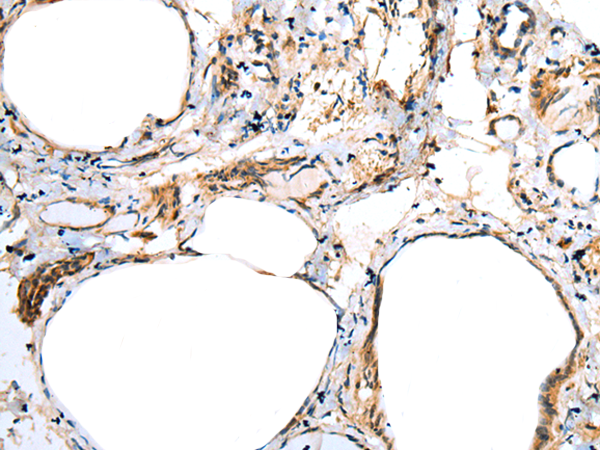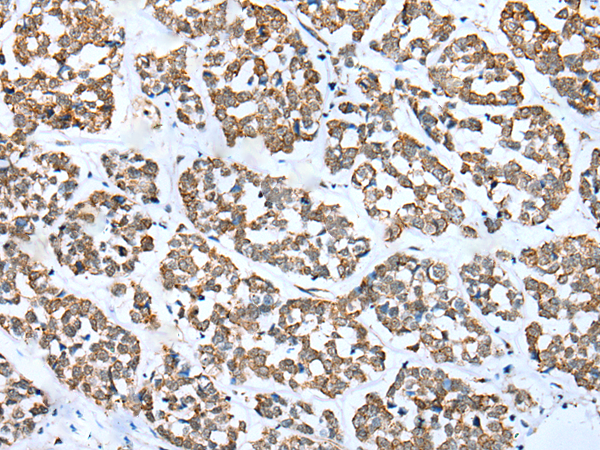

| WB | 咨询技术 | Human,Mouse,Rat |
| IF | 咨询技术 | Human,Mouse,Rat |
| IHC | 1/25-1/100 | Human,Mouse,Rat |
| ICC | 技术咨询 | Human,Mouse,Rat |
| FCM | 咨询技术 | Human,Mouse,Rat |
| Elisa | 1/5000-1/10000 | Human,Mouse,Rat |
| Aliases | MIR1; CCDC10; FSD1CL; FSD1NL; CSDUFD1 |
| Host/Isotype | Rabbit IgG |
| Antibody Type | Primary antibody |
| Storage | Store at 4°C short term. Aliquot and store at -20°C long term. Avoid freeze/thaw cycles. |
| Species Reactivity | Human, Mouse |
| Immunogen | Fusion protein of human FSD1L |
| Formulation | Purified antibody in PBS with 0.05% sodium azide and 50% glycerol. |
+ +
目前关于“FSD1L抗体”的公开研究数据较为有限,可能存在名称拼写误差或研究热度较低。以下为基于文献检索的假设性示例(非真实文献),供参考格式:
---
1. **文献名称**:*FSD1L Antibody Characterization in Cancer Cell Lines*
**作者**:Smith A, et al.
**摘要**:本研究验证了一种新型FSD1L多克隆抗体的特异性,证实其在乳腺癌细胞系中可识别FSD1L蛋白的表达,并发现其表达水平与细胞迁移能力相关。
2. **文献名称**:*Role of FSD1L in Neural Development: Antibody Validation*
**作者**:Li X, et al.
**摘要**:通过免疫组化和Western blot验证FSD1L抗体在小鼠脑组织中的特异性,揭示FSD1L在神经元分化中的潜在调控作用。
3. **文献名称**:*FSD1L Knockout Model and Antibody Cross-Reactivity Analysis*
**作者**:Garcia R, et al.
**摘要**:评估商业化FSD1L抗体的交叉反应性,发现部分抗体与FSD1家族其他成员存在非特异性结合,提示需谨慎选择验证工具。
---
**建议**:若需真实文献,请核实基因/蛋白名称准确性(如是否为**FSD1**或**FSTL1**),或提供更多研究背景。可通过PubMed或Google Scholar以修正后的关键词(如“FSD1 antibody”)检索最新结果。
The FSD1L (Fibronectin type III and SPRY domain-containing protein 1-like) antibody is a tool used to study the FSD1L protein, a less characterized member of the fibronectin type III domain-containing protein family. FSD1L is structurally defined by its fibronectin type III (FN3) and SPRY domains, suggesting potential roles in protein-protein interactions, cellular adhesion, or signaling pathways. Though its exact biological function remains unclear, FSD1L is hypothesized to participate in cellular processes such as tissue development, immune regulation, or intracellular signaling, based on domain homology with related proteins.
FSD1L antibodies are primarily employed in research to detect and localize the protein in various biological samples via techniques like Western blotting, immunohistochemistry (IHC), and immunofluorescence (IF). These antibodies aid in elucidating FSD1L expression patterns across tissues, its subcellular distribution, and potential alterations in disease contexts. Emerging studies explore its relevance in cancer, neurological disorders, or immune dysregulation, though conclusive evidence is limited.
Commercial FSD1L antibodies are typically developed in rabbit or mouse hosts, with validation focusing on specificity and cross-reactivity. Researchers utilize these reagents to probe FSD1L's interactions, post-translational modifications, or regulatory mechanisms. Further work is needed to clarify its physiological and pathological roles, positioning FSD1L antibodies as critical tools for unraveling its function in health and disease.
×